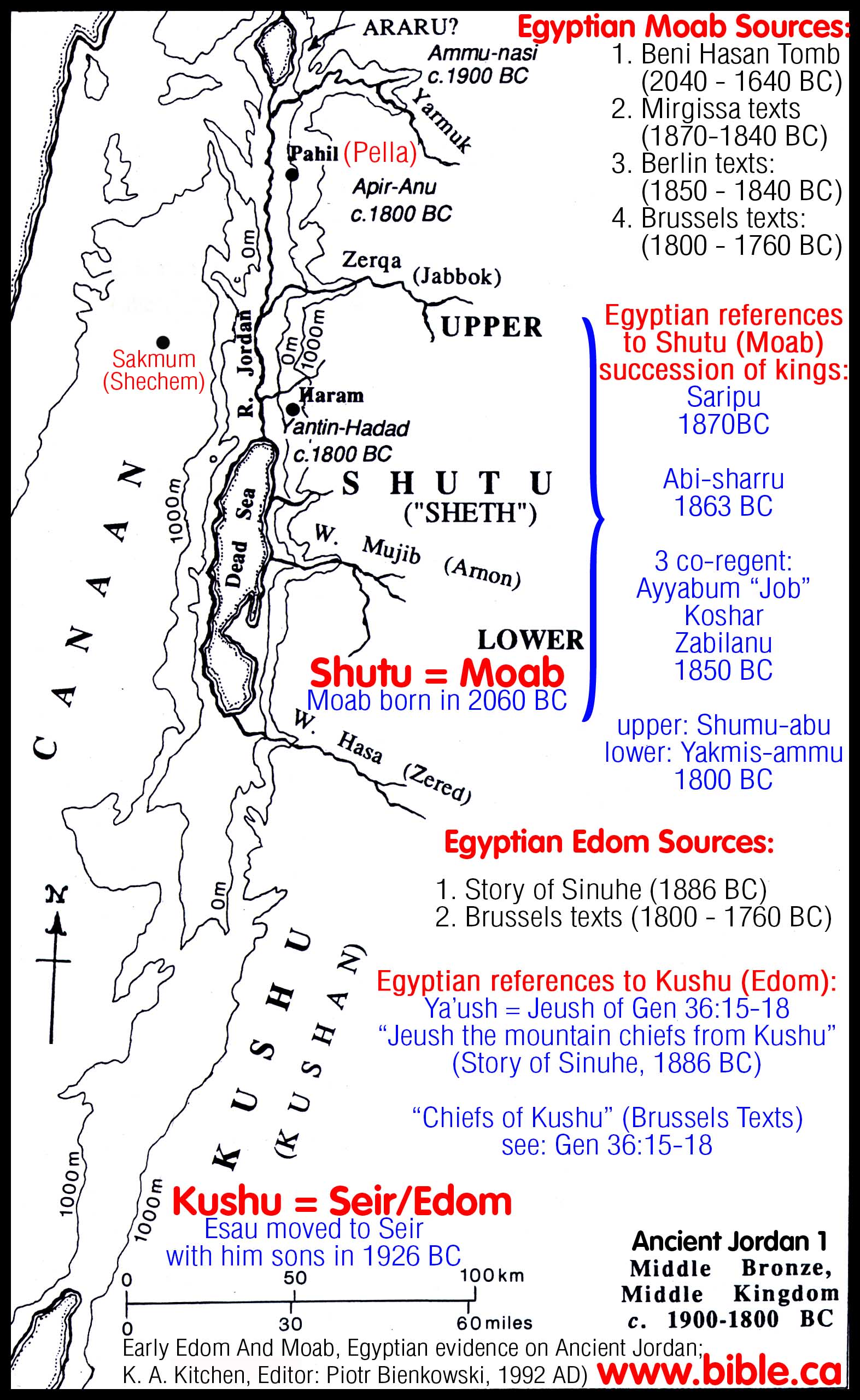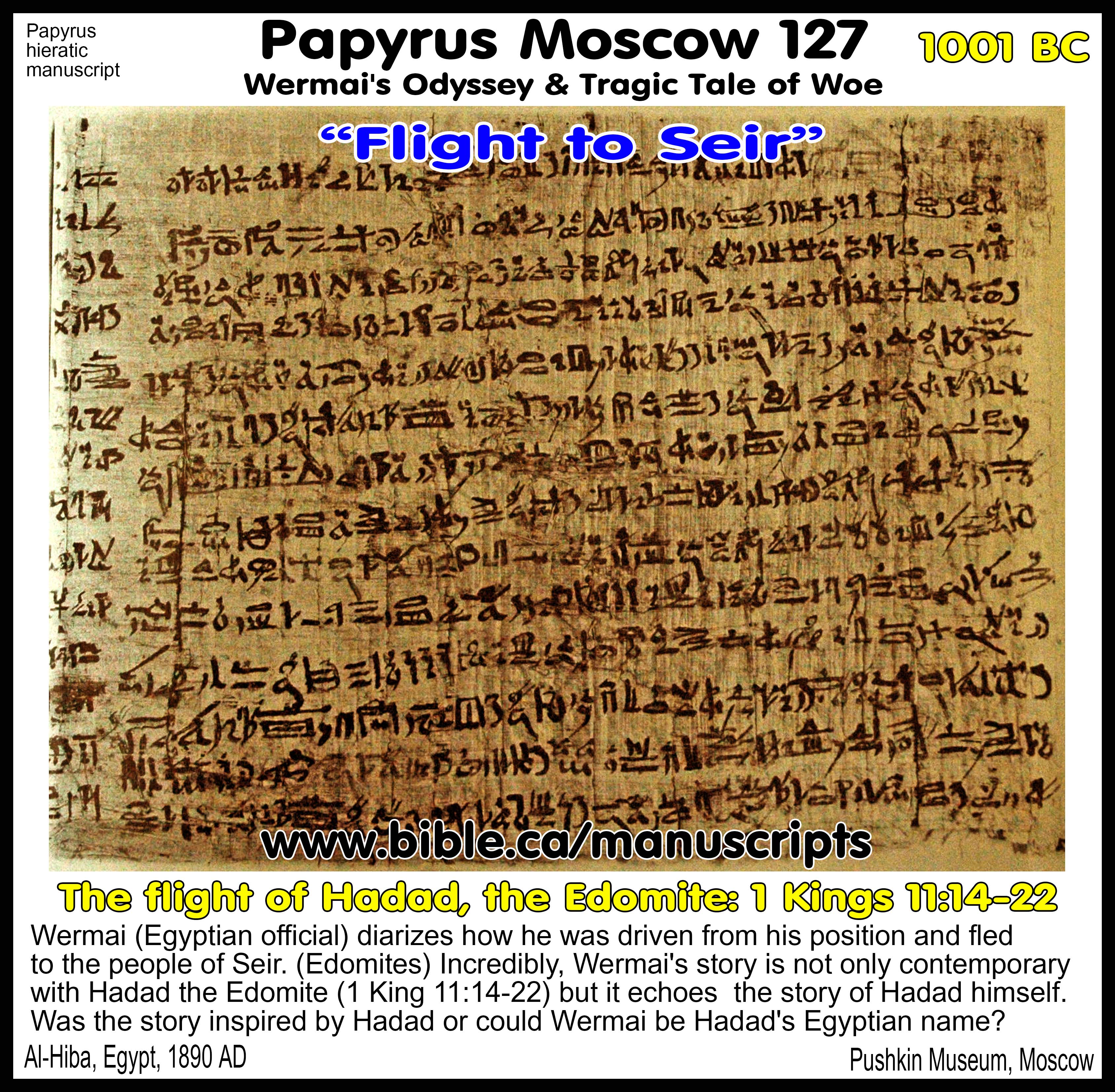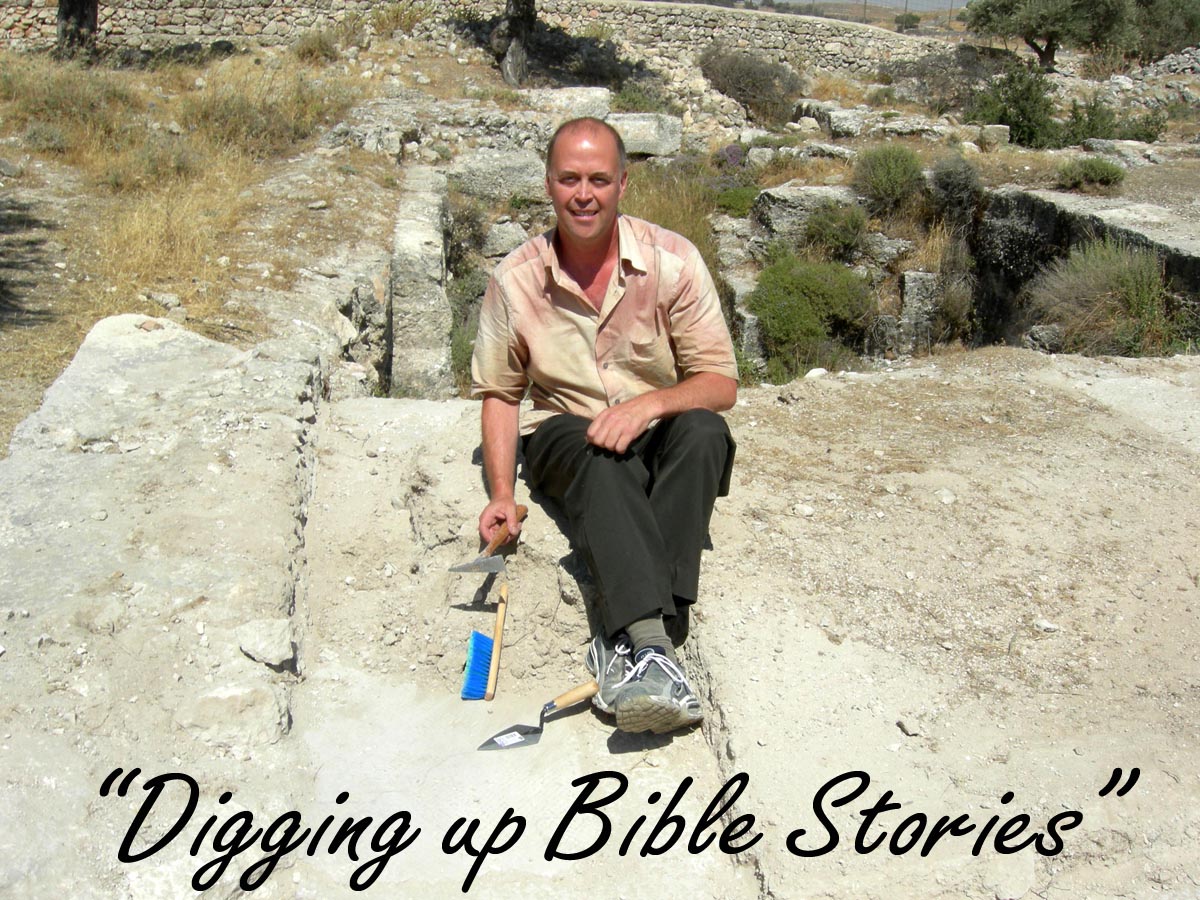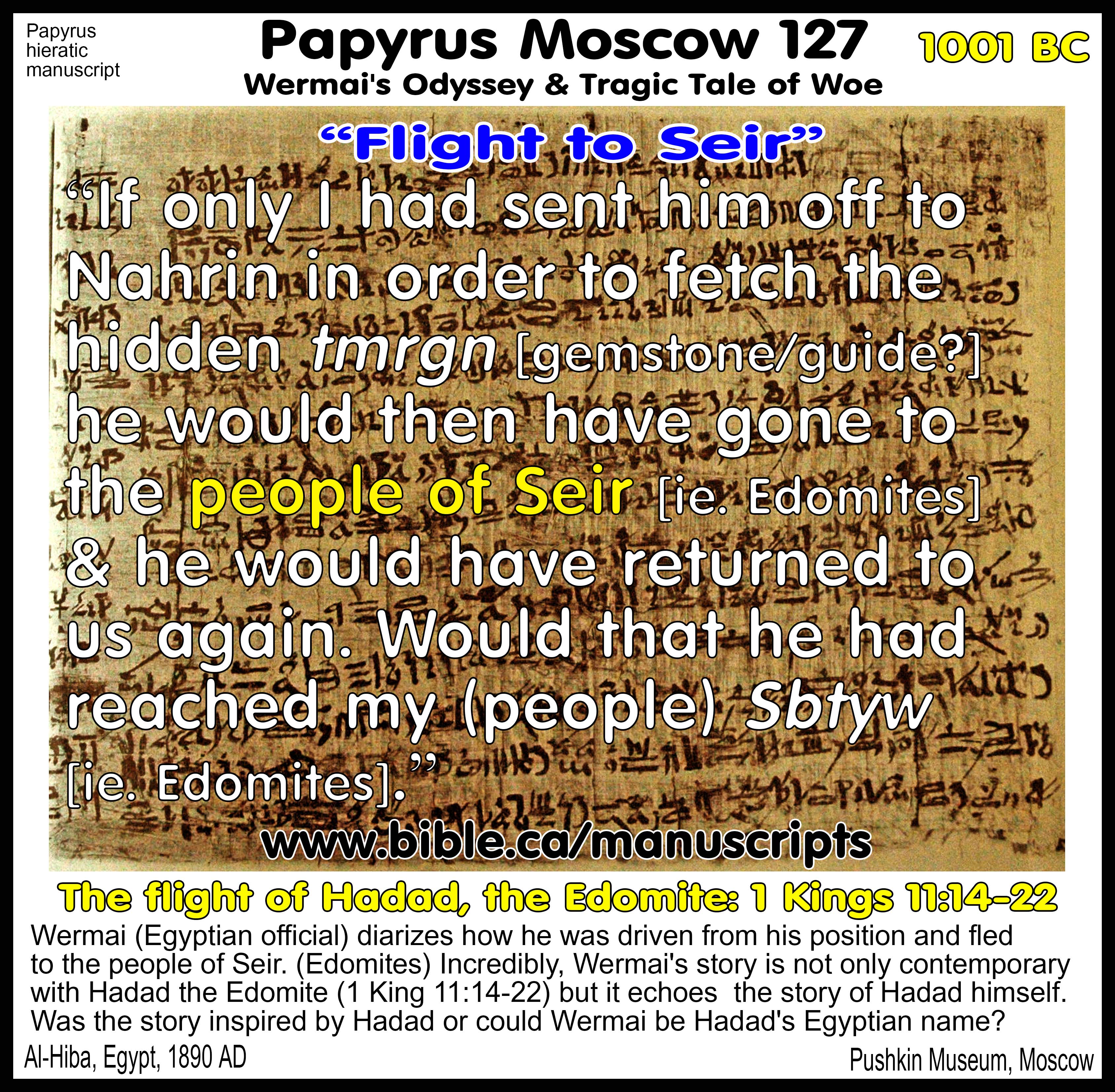Papyrus Moscow 127: Wermai's Odyssey & Tragic Tale of Woe
Edom in 1001 BC
"he would then have gone to my people of Seir"
|
Translation of Papyrus Moscow 127 "If only I had sent him off to Nahrin in order to fetch the hidden tmrgn [gemstone/guide?] he would then have gone to the people of Seir [ie. Edomites] and he would have returned to us again. Would that he had reached my (people) Sbtyw [ie. Edomites]." (Steve Rudd Adapted from Kitchen) |
|
Digging up Bible stories! Edom was founded by Esau, twin brother of Jacob (born 2006 BC) in 1926 BC (Age 30), when Esau moves to Seir and conquers the Horites (Deut 2:12,22). Esau goes extinct in 500 BC. Detailed outline on Edom.
|
Introduction:
- Papyrus Moscow 127 was written by Wermai (Egyptian official) who diarizes how he was driven from his position and fled to the people of Seir. (Edomites) Incredibly, Wermai's story is not only contemporary with Hadad the Edomite (1 Kings 11:14-22) but it echoes the story of Hadad itself. Was the story inspired by Hadad or could Wermai be Hadad's Egyptian name?
- It is entirely possible that Wermai who wrote the manuscript was in fact Edomite.
- Kenneth Kitchen observes the following about the Papyrus:
a. Kitchen associates this event as being contemporary with the flight of Hadad, the Edomite, to Egypt (1 Kgs 11:14–22).
b. Kitchen views Papyrus Moscow 127 as evidence for contact between Egypt and Edom during the time of David, since it mentions Seir. This should not surprise us since Solomon married an Egyptian princess.
c. Kitchen views 'those of Seir' refers to Seirites in Seir: the Edomites
d. Kitchen, translates the expression n3y-s'r, a genitive construction composed of the plural of the demonstrative n3 and the place name `Seir', as 'those of Seir', that is, the Seirites or Edomites who lived in Edom.
e. Kitchen believes 'fetch deliverance even from afar' shows that these Seirites were far from Egypt and not resident in Egypt.
- Map of ancient Edom: (Detailed outline
on Edom)

I. Translation of Papyrus Moscow 127:
|
"If (I) only had sent him (the messenger) to Nahrin in order to fetch the hidden mrgn, he would (then) have proceeded to (or, passed by) the (people of the land) S'r [Seir = Edom] and he would have turned to us again. Would that he had reached my (people)" (Papyrus Moscow 127, Translation and Notes, S. Allam, Egypt Exploration society, Vol 61, p 147, 1975 AD) |
- Kenneth Kitchen has translated the text but his translation is not available to us. We do have key aspects of his translation work, namely that
a. Kitchen, translates the expression n3y-s'r, a genitive construction composed of the plural of the demonstrative n3 and the place name `Seir', as 'those of Seir', that is, the Seirites or Edomites who lived in Edom.
b. Kitchen views 'those of Seir' refers to Seirites in Seir: the Edomites
c. Kitchen believes 'fetch deliverance even from afar' shows that these Seirites were far from Egypt and not resident in Egypt.
- Allam's translation as a student was submitted to his professor to check it for accuracy but the professor died before it could be checked. This student translation should be approached with caution but it is still valuable.
- "It is well known that the late Professor Cerny did not concern himself much with purely literary texts. Still, he occupied himself with this text, supposing that it might not be of a literary nature at all. As a result of his class I have been able to produce a complete translation which I submitted at that time to Cernyr. I hoped then that he could work anew upon it, checking some readings, adding some notes or comments towards a better understanding of this extremely difficult text. Alas, Cerny left us suddenly, and among the studies to be done by him was the present text. In arranging his note-books Miss Helen Murray of the Griffith Institute, Oxford was kind enough to return my translation and suggested at the same time that I might like to publish it. I think that it will be useful for students who would like to study the text or reconsider its interpretation ; others who deal with metrics will probably find herein a new challenge." (Papyrus Moscow 127, Translation and Notes, S. Allam, Egypt Exploration society, Vol 61, p 147, 1975 AD)
- "A copy of [the] message which the god's fatherz Wr-m?, son of Ijwy, of the Temple in Heliopolis has sent inquiring (after) the conditions of his brother Pi-Rr- ms (in) Heracleopolis, the royal scribe in (the) Residence (of King) Wsr-Mirt-R. He said: Life, prosperity (and) health to thee during thy lifetime. Mayest thou attain a good old age in the town of (god) Atum. Thy favour, may (it) remain with the kingship. Mayest thou be satisfied (with) the gods as well as (with) the people. (When) the sun-god rises in (the) sky, may ( , ) his look" encompass thy heart. May he come forth at thy prayers," he being pleased. I May he hear thy petitions, when(ever)I thou worshippest him. Mayest thou be anointed with his rays, (as long as) he is alive. May thy body proceed in health. May he expeP thy distress. May he come quickly (at thy) call . May he cause <thee> to reach " yearsi on earth, thy belly being whole, (thou) becoming old joyfully, there being no disease in thy body. May it (the body) be erect, thy heart being cheerful, without the feebleness which thy age might attain. May a union with (i , i o) deathI be far from thee, (when) thou art coldi (because of) the clay of the link-vesse. May becoming cold (because) of wine be far (from thee). Mayest thou wisely not approach it. May thy hours ati the ti-vesselsI not exist (with) thy nose being shut. May there not be a bad sme for thee. May thy body be whole, everything being in its (proper) place, thy heart being in its chest. May thy tongue proceed as it was (before) without vacillating. Mayest thou behold the place of mankind in the morning. May the sight of a place empty of people be far from thee, (while) thy divine eye is opened quickly for thee (and) the conduct of thy ears proceeds <without ?> restraint( ?) (, ) May thy belly be their companion, without fault (of) thine. Mayest thou be united (with the) sky, safe (and) sound. Mayest thou (be) like the justified onesn (and) join the Great Ones in Heliopolis. Mayest thou enter into (this) noble (assembly). Mayest thou be associated (with) thine offerings in the cabin. (Mayest thou) go before the God among the western (people), always. Further, I am remaining (here) through deceit. I have been wronged before saying (anything). (, ) I have been cheated without (any) wrong (on) my (part). I have been expelled from my town, (my) possessions were taken away—they are no (longer) safe. I wasI with all the Great (and) Wise (Ones) of the area they were also crying out to me. My wife has been killed in their presence. Their children have been carried off—some of them have been imprisoned in the slaughter-house, others have been taken away as captives, being loaded with possessions in front of me. My ser- vants have been driven (away). (z, o) (My) herds have been taken away. I (can)not seize (him) who violated my place of yesterday. The Strong- (Ones) have been placed on a remote road. The land has been enclosed by the flame of the enemy—south, north, west, (and) east belong to him. I [departed] (for) the crew of a boat that was not mine. (I) took my face( ?). (I) travelled through the land in haste, the river flowing out of its depth. (I) reached the north thereof, (namely) at (the town) (M)-bit. (I) travelled through arable land (and) Delta marshes in flowing (streams)I (until) the land Pdt-iw, (this) land (in which they) pitch (qd) (, I) their (sic) tents (towards) the west. (Thereupon, the land) Libya was entered. (As for) the Libyans, (they) were crossing Egypt widthwise. (They) shipwrecked (at the town) Pip). I proceeded to Heracleopolis( ?). I arrived at (the nome) Wibw. [I] entered the Great Oasis (Khargeh). (I) hastened (through) Upper Egypt, through every part (of) it. I travelled around to a village, being on foot. (I) seized (, ) horses, (I) stole chariots, my horses (became) frightened in (my) hand. (As I wanted to) take (hold of) their reins, another (man) was (already) upon them—(it was) not I who caused it. I was constrained to leave. (I) spent (some) time in a town not belonging to me <as> abode, which took no notice of a stranger"—with neither my old (friends, nor) newly acquired friends. (As long as my) limbs were apart from (my) belly, (I) tarried. When they (i.e. the limbs) were with (me), I (began to) exist. (I) had neglected (mk:) them in the distress. If only (one) had written in order to cheer (, I o) (my) heart as (I) came in (the) calamity. Never has (one) inquired (after) (my) conditions as (I) came on (this) road. Flesh (and) bones are cast in a cavern. Who will conceal it ? If (one) only had written in order to comfort (my) heart. Behold, there are no chiefs --. They have not cared for me during my pains. Why are they (existing), except (for the) many (things that will occur) to me (in) the necropolis ? I am (in) the sight of the horizon-dwelling (god). May he rescue (me) from the desert (and) from the disturbance. (My) belly is (now) whole, my condition (of) yesterday is over. I am hale in (, ) his (the god's) retinue. (I) came in the morning so that (I might) put under his command my heart's concern through my petitions( ?) (I) sent to thee (, I) a messenger (with) my copy (of the message) in a pot( ?) I was unaware of the corn, (I) did not know it. He (the messenger) is not a man who looks like a good (man). He set out on my (behalf) because (there was) no (other)( ?); therefore he went out. (I) was aware (of it), my heart was correct (about it). I spent a month stewing (lit. stinking) because of the corn, (I) was furious( ?) On what account are the people among whom I (live) existing ? Their notables have become few. The Nile ceased, their land (, ) is empty. I (could) not set out . (I) asked for a (boat) from the hand of its (the boat's) (or, his, i.e. the messenger's) master. His promise was to set forth. A crew was brought to it (or, him) (through) flattery. Their wagesI [were set] for each one of them, apart from (what [they] might) gather, (besides) their rations (which consisted of) salt, natron, vegetables, winr-, (and) isr- (plants). (I) wrote to thee, (my) heart being confident, thinking (that) it (the boat) (or, he, i.e. the messenger) will come back without anything. (But) my brother caused (that) it (or, he) should return with abundance (of things). He (the messenger) set a heap of corn for his master, (for) each concern of his. His heart was confident, (, o) thinking (sdd?) (that) he will return to me. He spent a month (on) his journey. He spent (it) because it (the boat) had suffered distress (and) was cast on the ground like a boat (of) . . . cattle( ?). His (or, its, i.e. the boat's) master caused me (to) be accused (in) the court. He did evil to me in my town. His fees were for me( ?) heavier than his granite. His priceI was (too) much ; (it) has been received (by him) and the crew. He let me wait (here) lacking my grain (Js) which others had given to me—(I) received it (on) his journey (and) that of their ships( ?), (its measure) being not full. (Thereupon I) said : If (I) only had controlled his oipe-measure (that was) forged (already) at its manufacture.'" How guilty is the carpenter"' who manufactured it ! By it one 'tile( ?)b is (., ) ihir (and) Oipe. I As Atum, the unique" (God), endures: He stole it. It is (incumbent ?) on me (now to) explain" (the) affair( ?) (of the) grain (and) the fees. He waited a day." (Then) he came to me saying : It is terrible, (namely the) rmm-corn( ?). (I) did not know (it). It is no (longer) left <in> the field. (, ) , there is no punishment" for them. I said to my heart : May the sparrows take them away. Their remainder" would be (then) the rmrm-corn( ?). Mayest thou free me from (the) fees (of) the crew. They (i.e. the crew) cause me to be extremelyII ashamed. Would"' that (I) had not sent (him) to" thee. A monstrous crime has been (committed) unto (the) God. One travels around, while it is happening to (me). Who will conceal it ? I say: (It is) thy wrath,n God, that caused it. Come, rescue" <me> from them. If (I) only had sent him (the messenger) to Nahrin (, ) in order to fetch the hidden mrgn, he would (then) have proceeded to (or, passed by) the (people of the land) S'r [Seir = Edom] and he would have turned to us again. Would that he had reached my (people) Sbtyw. (verso) () my (persea-)tree, my (persea-)tree, () Khons, () my (persea-)tree, make whole (my) lifetime. (I) said (it). What shall I say to (my) heart? They ( ) aid: The heart, (may it be) praised ( ?). A copy of [the] message which the god's father has sent. (Papyrus Moscow 127, Translation and Notes, S. Allam, Egypt Exploration society, Vol 61, p 147, 1975 AD)
II. Outline of the story in the Papyrus Moscow 127:
- "This papyrus was written by a certain Egyptian official, Wermai, who was driven from his position and consequently fled to “those of Seir.” Kitchen associates this event as being contemporary with the flight of Hadad, the Edomite, to Egypt (1 Kgs 11:14–22). Hence, the text alludes to contact between Egypt and Palestine (Transjordan) at the time of David." (The Near East Archaeological Society Bulletin, Volume 56, p26, 2011 AD)
- "Wermai was removed from his position, he was gbj: defrauded, cheated, afflicted, and exiled from his city, losing all his property. Enemies robbed him and either killed or imprisoned women and children, his servants 'took the lead of them'. He was thrown out of office, and forced to wander whilst the country dissolved into chaos: 'enveloped in the flames of war'. This summary is typical of Wermai's approach to explaining his sufferings, they are oblique with no details or clarity and he makes a habit of skipping over any events which should be more important considering the request embodied by this letter is for justice. Wermai then joins the crew of a ship and first travels to Chemmis (near Buto), from there he proceeds outside of the borders to Pedjetshu, jumps to the opposite side of the delta to Tjemeh (Libyan territory) and Tjehnu before returning from the foreign lands to Troia (Tura) and travelling upstream into Upper Egypt, arriving at Kenmet (the Kharga Oasis). In corroboration, the Banishment Stela details Menkheperre's return of exiled servants from the Kharga Oasis and this has been taken by Kaper as an indication that the oases were where adversaries of the administration were banished to.107 For Wermai this implies that his exile is not self-imposed but forced by the administration. Continuing with the letter, this is an erratic, long and complicated journey in which we have to assume Wermai abandoned the boat along the way. Wennai clearly does not consider this wandering around the perimeters of Lower Egypt to be important to his story, it is delivered rapidly with scant information. In Kenmet, Wermai's suffering continues as his previously unmentioned horses and chariot are 'wrested' from him,'" he is beaten and is forced to carry on wandering between villages on foot. He is treated as a stranger with no friends, when he does make friends they do not remain so for long. Wermai launches into a soliloquy about his victimisation and loneliness and worries about what would happen if he were to die on the desert-edge. However this can all be solved by informing the god of his problems. It is at this stage of the letter that Wermai states his first request: `do send a messenger to him with a copy of my letter from your place'. After the first request, Wermai continues to list his current grievances: 'I know of no grain, nor do they know of it'll° He and his neighbours are starving, the Nile has stopped so they cannot provide for themselves and the local official turns away any pleas as well as restricting wages, overtaxing people and using false corn-measures. The one time this particular official was questioned by 'an inquirer', presumably a superior, he declared that he would produce `heaps of grain' but instead in an unusual turn of events, took Wermai to court. Wermai begs the recipient for help with these matters; he begs that justice is done against the one who is victimizing him: 'that he may attack my suppressors'. Wermai's letter ends here. He has outlined at length his troubles, from his fall from presumed high status, to his temporary exile from Egypt to specific incidents of violence and judicial malpractice. Wermai has made two requests of Usermaatre-nakht: that he makes a copy of the letter for the god, and that he send someone to attack his current enemies who are pursuing unjust legal and physical action against him and his neighbours. He thus wishes to resolve both his past troubles with the gods which have led to his loss of prosperity, and his current pressing concerns of starvation and lawsuits. As Usermaatre-nakht is a Royal Scribe it is perhaps not unwarranted to read this letter as a plea to the Pharaoh himself to take action. Thus, the unfair persecutions of Wermai in Egypt, which have been dated to sometime in the 21st Dynasty, depict an image of Egypt in a state of war, famine and anarchy. In order to read this text as a literal letter, written by a real man named Wermai to Usermaatre-nakht, this image needs to correspond with our cut-rent understanding of historical events in Egypt during the 21st Dynasty." (What is Papyrus Pushkin 127?, Luke Toby McGarrity, University of Birmingham, p 23, 2013 AD)
III. Authorities on Papyrus Moscow 127:
- "Papyrus Moscow 127 (copied c. 1000 BCE), a (probably) pseudo-historical letter found in 1890 CE near El-Hibeh in the same cache of papyri as the Report of Wenamun and the Onomasticon of Amenope, recently has been cited by Kitchen as evidence for contact between Egypt and Edom during the time of David, since it mentions Seir. The extant text consists of 65 lines of writing in hieratic. It purports to have been written by a certain Egyptian official, Wermai, who was wrongfully ousted from his position as `god's father of the temple at Heliopolis'. He subsequently fled and settled in an area oppressed by an unnamed ruler. At the end of the text, Wermai mentions another individual, his savior (or his oppressor), who had gone to 'those of Seir'. The pertinent section of the text translates somewhat as follows: 'If only I could send him [his savior or his oppressor] off to Naharin, to fetch the hidden tmrgn [guide?), with whom he had gone to those of Seir'. According to Kitchen, this event dated to about the same time as the flight of Hadad the Edomite to Egypt (1 Kgs 11.14-22). Consequently, this text may attest to contacts between Egypt and Palestine at roughly the time of David. … The meaning of the expression 'those of Seir' is uncertain. Kitchen, on the one hand, translated the expression n3y-s'r, a genitive construction composed of the plural of the demonstrative n3 and the place name `Seir', as 'those of Seir', that is, the Seirites or Edomites who lived in Edom. Caminos, on the other hand, translated the text as 'those from Seir' and located these Seirites in Egypt not Edom.'" Unfortunately, the exact nuance of the expression cannot be fully explicated. Kitchen attempted to refute Caminos's conclusion that the Seirites were in Egypt by noting that Wermai's desire to 'fetch deliverance even from afar' shows that these Seirites were far from Egypt. However, owing to the extensive use of pronouns throughout the text, it is difficult to decipher the object of Wermai's statement, either his savior or his oppressor. In either case, however, it is not necessary to understand the location of 'those of Seir' as a point far from Egypt. The text simply notes that this individual went to 'those of Seir' with the 'hidden tmrgn'. Nevertheless, there seems to be no good reason to doubt that 'those of Seir' refers to Seirites in Seir, as Kitchen concluded." (David, Solomon and Egypt: A Reassessment, Paul S. Ash [a minimalist], Papyrus Moscow 127, p46, 1999 AD)
- "The palaeography of P. Pushkin 127 is meticulously examined by Caminos, who prefers the idea that all three papyri are written in different but related hands, probably sourced from the same institution, and are all palaeographically from the same time during the 21st Dynasty." (A Tale of Woe, Papyrus Pushkin 127, R. Caminos, p3, 1977 AD)
Conclusion:
- 150 years ago, bible scoffers chortled that Edom as a nation was "Just another Bible myth but once again the Bible is proven as a record of real history.
- The Papyrus Moscow (Pushkin Museum) 127 echoes the story of Hadad the Edomite in 1 Kings 11:14-22 and confirms through archeology, the Bible record that Edom, Egypt and Judah were in direct contact with each other from the Iron age (David, Solomon).
- Contact between Egypt and Israel is visible today in the Palace Solomon built his Egyptian wife around 960 BC.
- Jer 8:7 was written in 597 BC and references the past judgement of God in 587 BC. And at that time, God pleaded for repentance down to the last hour before the temple was burned. My point is that there have been countless judgements in the past and never was grace not available until "noah shut the door".
- What we read in the book, we find in the ground, or in this case in the Papyrus Pushkin 127 manuscript that dates to 1001 BC.
By Steve Rudd: Contact the author for comments, input or corrections.



